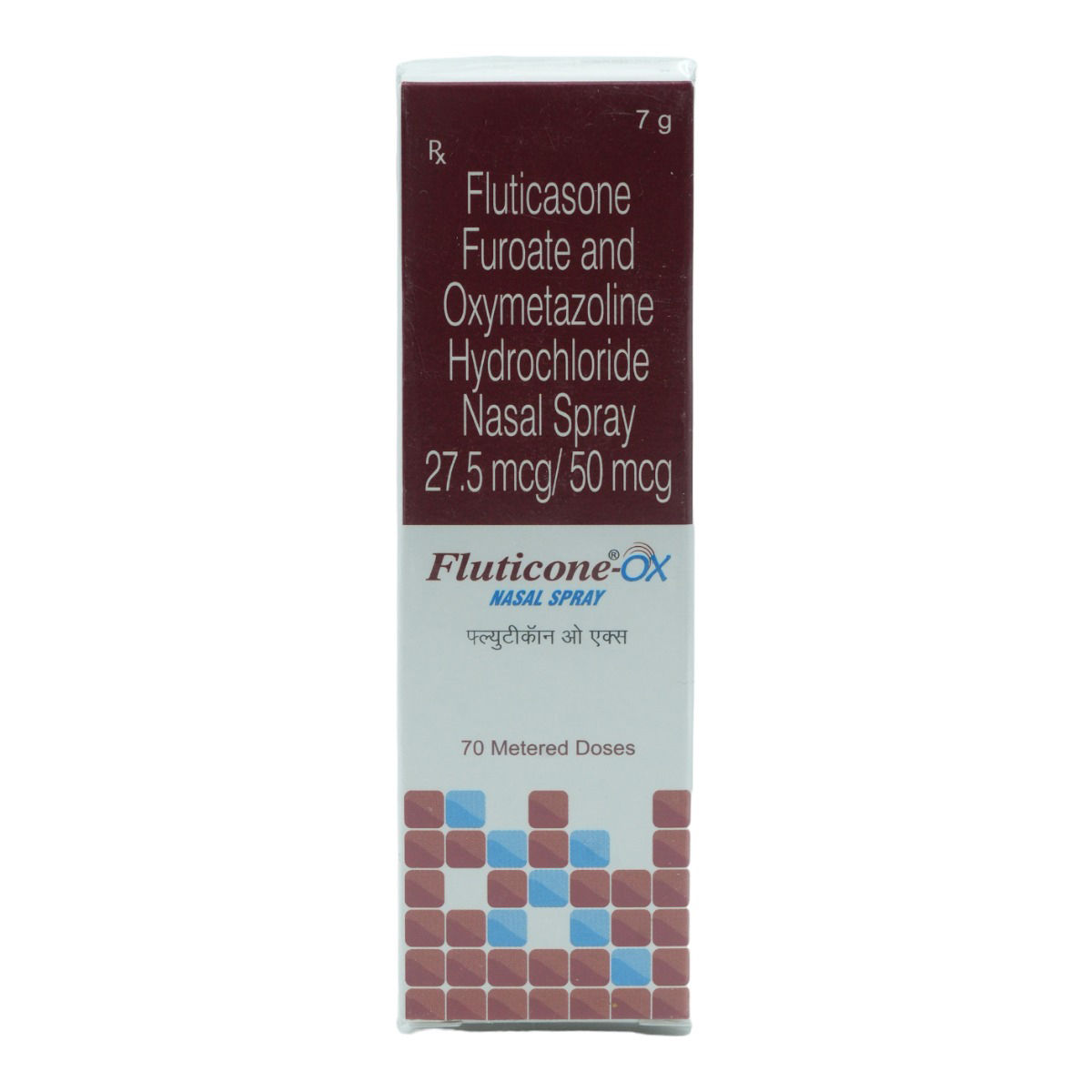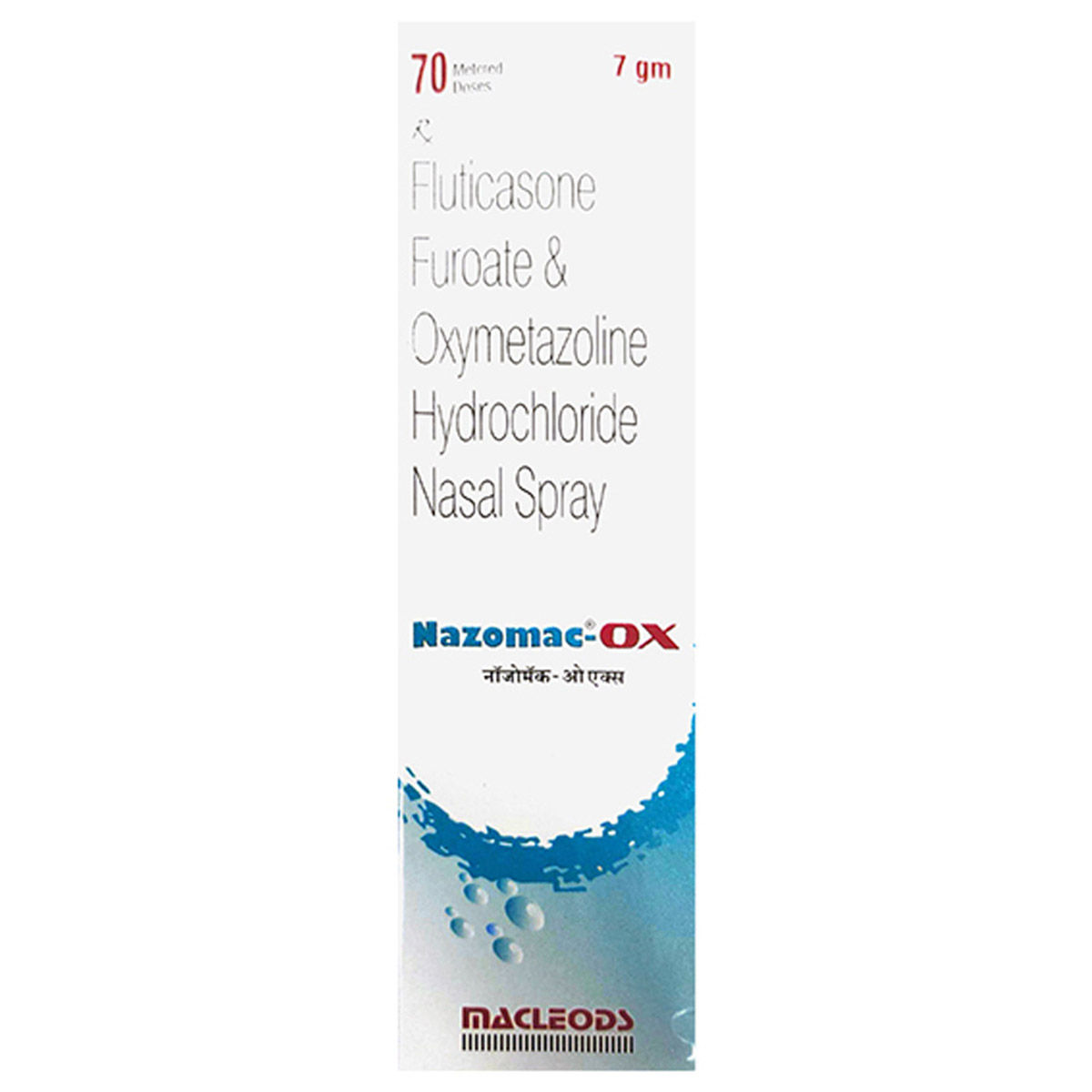Fluticasone Furoate+oxymetazoline
About Fluticasone Furoate+oxymetazoline
Fluticasone Furoate+oxymetazoline is used to treat perennial allergic rhinitis. Perennial allergic rhinitis is an inflammatory condition which can occur for an hour or last for more days throughout the year. Symptoms may include sneezing, runny nose, congestion, stuffy nose or watery eyes.
Fluticasone Furoate+oxymetazoline is a combination of Fluticasone furoate (corticosteroid) and Oxymetazoline (decongestants). Fluticasone furoate inhibits the release of certain chemicals in the body that cause inflammatory reactions. On the other hand, Oxymetazoline contracts and narrows the blood vessels in the linings of nasal passages. Thus, it helps provide relief from allergic rhinitis.
Fluticasone Furoate+oxymetazoline should be used as advised by your doctor. Your doctor will recommend how often you need to take Fluticasone Furoate+oxymetazoline based on your medical condition. This medicine may cause certain common side effects such as headache, taste changes or nose bleeds. Most of these side effects do not require medical attention and gradually resolve over time. However, if the side effects persist or worsen, please consult your doctor.
Avoid using Fluticasone Furoate+oxymetazoline if you are allergic to it or any other components in it. If you have diabetes, high blood pressure, hyperthyroidism, or heart disease, inform your doctor before using Fluticasone Furoate+oxymetazoline. Avoid using this medicine if you have narrow-angle glaucoma or if you have undergone recent trans-nasal surgery. You are recommended to remove nasal fluids by blowing the nose before applying Fluticasone Furoate+oxymetazoline. Avoid sharing this medicine with other people to prevent the spread of infection. If you are pregnant or breastfeeding, inform your doctor before using Fluticasone Furoate+oxymetazoline. This medicine is not recommended for children below six years of age.
Uses of Fluticasone Furoate+oxymetazoline
Medicinal Benefits
Fluticasone Furoate+oxymetazoline is a combination of Fluticasone furoate (corticosteroid) and Oxymetazoline (decongestants). Fluticasone furoate inhibits the release of certain chemicals in the body that cause inflammatory reactions. On the other hand, Oxymetazoline contracts and narrows the blood vessels in the linings of nasal passages. Thus, it helps provide relief from allergic symptoms such as sneezing, running nose, watery eyes, itching, swelling, and congestion or stiffness.
Directions for Use
Storage
Side Effects of Fluticasone Furoate+oxymetazoline
Irritation or dryness of the nasal mucosa (tissue lining nasal cavity)
Local burning sensation
Headache
Nausea
Drug Warnings
Fluticasone Furoate+oxymetazoline should be avoided if you are allergic to any of the medicines. If you have diabetes, high blood pressure, hyperthyroidism, or heart disease, inform your doctor before using Fluticasone Furoate+oxymetazoline. If you are pregnant or breastfeeding, inform your doctor before using Fluticasone Furoate+oxymetazoline. Avoid taking Fluticasone Furoate+oxymetazoline if you have narrow-angle glaucoma or if you have undergone recent trans-nasal surgery. You are recommended to remove nasal fluids before applying Fluticasone Furoate+oxymetazoline by blowing the nose. Avoid sharing Fluticasone Furoate+oxymetazoline with other people to prevent the spread of infection. Fluticasone Furoate+oxymetazoline is not recommended for children below six years of age. It is recommended to avoid smoking and alcohol consumption as it may increase adverse effects.
Drug Interactions
Drug-Drug Interactions: Fluticasone Furoate+oxymetazoline may interact with antidepressants (imipramine, desipramine, nortriptyline, doxepin, clomipramine, amitriptyline), ergot alkaloids (ergonovine, dihydroergotamine, ergotamine, methylergonovine), MAO inhibitors (linezolid, isocarboxazid, rasagiline, phenelzine, selegiline, tranylcypromine), HIV/AIDS drug (ritonavir), antifungals (ketoconazole, fluconazole, itraconazole).
Drug-Food Interactions: Fluticasone Furoate+oxymetazoline may interact with caffeine and grapefruit juice. Therefore, avoid the intake of grapefruit juice and the intake of caffeine (chocolate, tea, coffee, colas and some herbal supplements). Also, avoid alcohol consumption with Fluticasone Furoate+oxymetazoline as it may cause increased drowsiness, dizziness, impaired judgment, and thinking.
Drug-Disease Interactions: If you have diabetes, high blood pressure, hyperthyroidism, enlarged prostate gland, narrow-angle glaucoma or heart disease, inform your doctor before taking Fluticasone Furoate+oxymetazoline.
Drug-Drug Interactions Checker List:
Safety Advice

Alcohol
unsafeAvoid consumption of alcohol with Fluticasone Furoate+oxymetazoline as it may increase adverse effects. Please consult a doctor before consuming alcohol with Fluticasone Furoate+oxymetazoline.

Pregnancy
cautionIf you are pregnant or planning pregnancy, inform your doctor before using Fluticasone Furoate+oxymetazoline. Your doctor may prescribe this medicine if the benefits outweigh the risks.

Breast Feeding
cautionIf you are breastfeeding, inform your doctor before starting treatment with Fluticasone Furoate+oxymetazoline. Your doctor may prescribe this medicine if the benefits outweigh the risks.

Driving
cautionFluticasone Furoate+oxymetazoline may cause drowsiness in some people. Therefore, drive only if you are alert after using Fluticasone Furoate+oxymetazoline.

Liver
cautionFluticasone Furoate+oxymetazoline should be used with caution in patients with liver disease. Let your doctor know if you have any history of liver disease. Your doctor will weigh the benefits and potential risks before prescribing Fluticasone Furoate+oxymetazoline.

Kidney
cautionFluticasone Furoate+oxymetazoline should be used with caution in patients with kidney disease. Let your doctor know if you have any history of kidney diseases. Your doctor will weigh the benefits and potential risks before prescribing Fluticasone Furoate+oxymetazoline.

Children
unsafeFluticasone Furoate+oxymetazoline is not recommended for children below six years as the safety and effectiveness were not established.
Habit Forming
Diet & Lifestyle Advise
- Add ginger to foods or tea as it contains some anti-inflammatory compounds and reduces cough, irritation and swelling in nasal passages.
- Staying hydrated to get relief from runny nose, cough, and sneezing.
- Try to do deep breathing, regular exercise, and try progressive muscle relaxation techniques to get relief from stress.
- It is advised to avoid contact with known allergens (allergy-causing agents) such as pollen, dust, etc. Certain food items are known to cause allergies to you.
- Maintain personal hygiene and keep your surroundings clean.
Special Advise
Patients Concern
Disease/Condition Glossary
Perennial Allergic Rhinitis: Allergy is a condition that occurs when the immune system reacts to a foreign substance (allergens) that is typically not harmful to the body. Perennial allergic rhinitis is an inflammatory condition which can occur for an hour or last for more days throughout the year. Symptoms may include sneezing, runny nose, congestion, stuffy nose or watery eyes.
FAQs
Fluticasone Furoate+oxymetazoline is used to treat perennial allergic rhinitis, a condition that occurs when the immune system reacts to a foreign substance.
Fluticasone Furoate+oxymetazoline is a combination of Fluticasone furoate (corticosteroid) and Oxymetazoline (decongestants). Fluticasone furoate inhibits the release of certain chemicals in the body that cause inflammatory reactions. On the other hand, Oxymetazoline contract and narrows the blood vessels in the linings of nasal passages. Thus, helps provide relief from allergic symptoms such as sneezing, running nose, watery eyes, itching, swelling, and congestion or stiffness.Â
No, Fluticasone Furoate+oxymetazoline is not recommended for use if you had a recent nose operation or have any nose infections, as it may lead to nose bleeding and excessive pain in the nose, leading to further worsening of your condition. Consult your doctor and do as advised for the best results.
People who are allergic to any of the ingredients in Fluticasone Furoate+oxymetazoline should avoid using it. Additionally, individuals with narrow-angle glaucoma (a condition where the angle between the iris and cornea is too narrow) or those who have recently undergone trans-nasal surgery should avoid using it. Children under six years of age should not use this medication. Consult your doctor before using Fluticasone Furoate+oxymetazoline, especially if you have any existing health conditions such as diabetes, high blood pressure, overactive thyroid, or heart disease.
Fluticasone Furoate+oxymetazoline may cause side effects in some individuals, such as headaches, changes in taste, or nosebleeds. These side effects are typically mild and tend to improve or resolve on their own without requiring medical attention. However, if the side effects worsen or do not go away after a few days, please consult your doctor for advice.
If you are pregnant or planning to become pregnant, inform your doctor before using Fluticasone Furoate+oxymetazoline. While there is limited information on the safety of this medication during pregnancy, your doctor may prescribe it if the benefits outweigh the risks.
Fluticasone Furoate+oxymetazoline is not recommended for children under six years old, as its safety and effectiveness have not been established for this age group.
If you accidentally take an overdose of Fluticasone Furoate+oxymetazoline, there’s no need to panic, as it does not cause life-threatening effects. However, it is important to contact your doctor or seek medical advice as soon as possible if you experience any symptoms, such as increased nasal irritation, headache, dizziness, difficulty breathing, damage to your nose, or blurred or cloudy vision.



